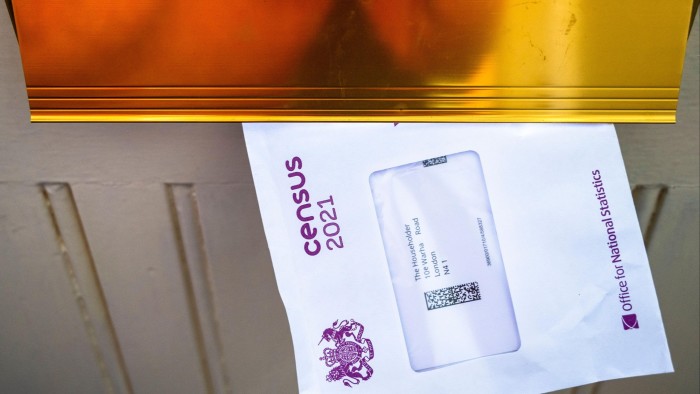Unlock the Editor’s Digest for free
Roula Khalaf, Editor of the FT, selects her favourite stories in this weekly newsletter.
The UK should continue to conduct its traditional once-a-decade census the country’s statistics authority said on Tuesday, in an admission that alternative data sources cannot yet replace the costly household survey.
Sir Robert Chote, chair of the UK Statistics Authority, said it was advising ministers to commission a mandatory questionnaire-based census in England and Wales in 2031, which could be “supported by the growing power of administrative data and new technologies”.
There had been plans to scrap or drastically scale back the survey that has underpinned the UK’s official count of its population for more than 150 years.
But policymakers who rely on the census to guide the provision of public services, as well as commercial users, worry that there is no other way to collect key information on ethnicity, language preferences and living conditions, among many other characteristics.
Statisticians headed off a similar push in 2014 by the Conservative minister Francis Maude, who wanted to replace the 2021 census with alternative data from state and private sources.
Since then, the Office for National Statistics has launched a big push to develop its use of administrative data sources — including to underpin its six-monthly estimates of migration.
This was a key strategic aim of Sir Ian Diamond, who stepped down as national statistician earlier this year as the ONS faced growing criticism over the quality of key economic data.
There is now a recognition within the ONS that it needs to devote more resources to keeping its traditional surveys running, as progress in developing administrative data relies on the co-operation of other government departments and has been much slower than hoped.
Supplies of data agreed with other parts of government “are interrupted too often, sometimes at short notice, and when data arrive they are not always delivered in a usable form”, UKSA said.
It urged ministers to resource the ONS to develop administrative-based statistics that “provide more frequent estimates [than the census] and are inclusive in representing society”, while also committing to a reliable, ongoing flow of the data sets needed to underpin the exercise.
Spending plans set out by the government last week include an uplift of about £100mn in UKSA’s annual budget for the next three years.
The Treasury said this would fund preparatory work for a 2031 census, subject to the government’s decision, as well as work to improve key economic statistics and recover the quality of “critical” labour market data.
UKSA’s recommendation will also inform separate decisions in Scotland and Northern Ireland.




